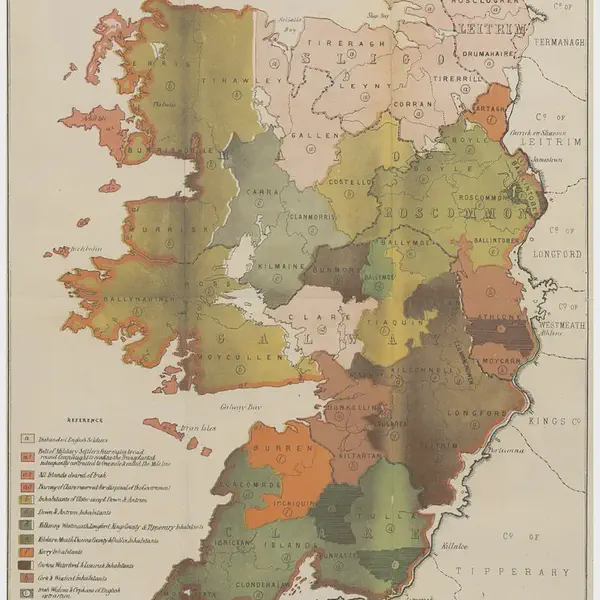
Act of Settlement 1652, Also Known as the to Hell or Connacht Act
August 12, 1652
Oliver Cromwell (April 25, 1599 – September 03, 1658) was an English military leader and politician. After leading the overthrow of the British monarchy, he ruled England, Scotland, and Ireland as Lord Protector from December 16, 1653 until his death. Cromwells actions made him very unpopular in Scotland and Ireland which, as previously independent nations, were effectively conquered by English forces during the civil wars.
In the wake of the Cromwellian Irish conquest, all Catholic owned land was confiscated in the Act of Settlement 1652 and the practice of Roman Catholicism was banned. Regardless, Ireland remained a Roman Catholic nation as most Irish Catholics refused to abandon their faith.
In particular, Cromwells brutal suppression of the Royalists in Ireland during 1649 still has a strong resonance for many Irish people. The most enduring symbol of this alleged brutality is the siege of Drogheda in September 1649. The massacre of nearly 3,500 people in Drogheda after its capture — comprising around 2,700 Royalist soldiers and all the men in the town carrying arms, including some civilians, prisoners, and Catholic priests — is one of the historical memories that has fuelled Irish-English and Catholic-Protestant strife for over three centuries.
The Act for the Settlement of Ireland 1652 was passed by the Long Parliament after the Cromwellian conquest of Ireland, itself in response to the Irish Rebellion of 1641.
Ten named leaders of the revolt, together with anyone who had participated in its early stages and who had killed an Englishman other than in battle, lost their lives and estates.
Remaining leaders of the Irish army lost two-thirds of their estates. To have been merely a bystander was itself a crime and anyone who had resided in Ireland any time from October 01, 1649, to March 01, 1650 and had not manifested their constant good affection to the interest of the Commonwealth of England lost one-third of their land. The Commissioners in Ireland had power to give them, in lieu thereof, other (poorer) lands in Connacht or Clare in proportion of value and were authorised to transplant such persons from the respective places of their usual habitation or residence, into such other places within that nation, as shall be judged most consistent with public safety. This they interpreted liberally and ordered all Irish land owners to leave for those lands before 1 May, 1654 or be executed. (Hence the expression, To Hell or to Connaught).
In the next of the Plantations of Ireland, the confiscated land was granted to the Adventurers who had joined the conquering army. (The settlement refers to settling of scores, not to settlers. The new owners were known as planters.)